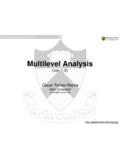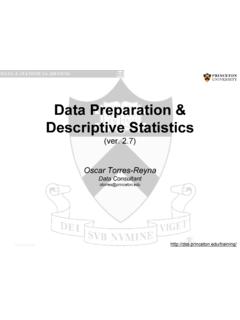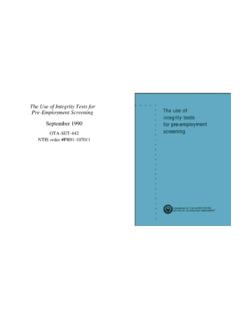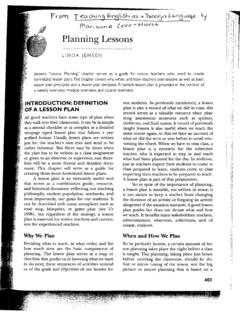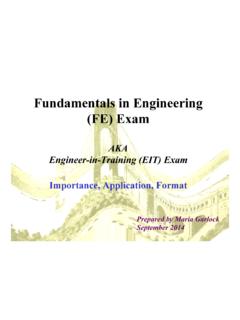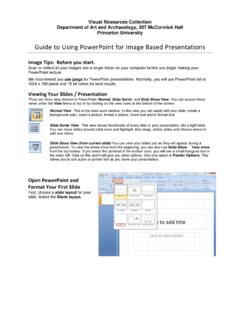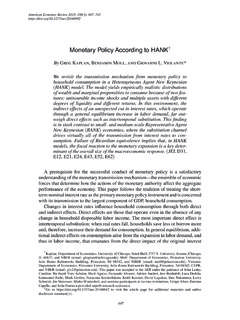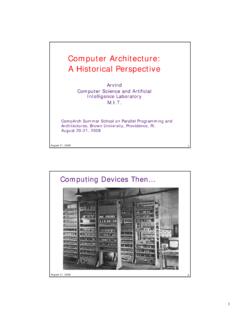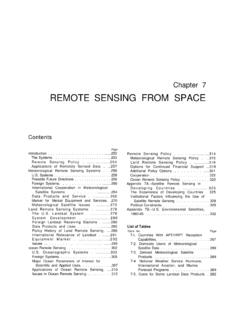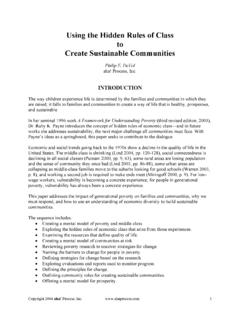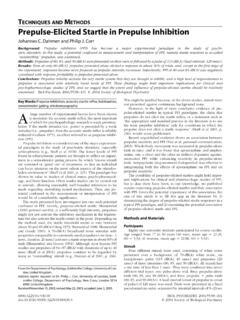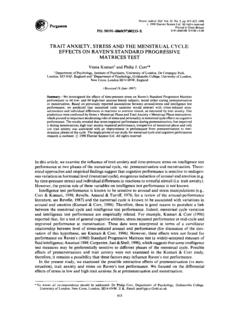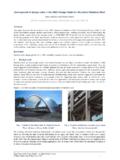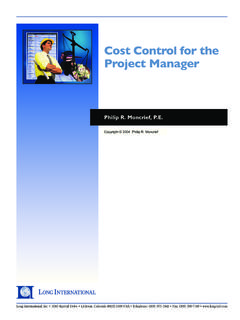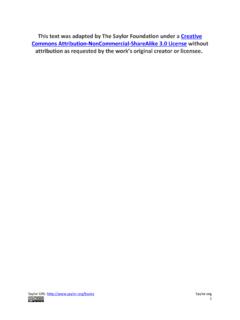Transcription of Freedom in the market - Princeton University
1 Freedom in the marketPhilip PettitPrinceton University , USAabstractThe market is traditionally hailed as the very exemplar of a system underwhich people enjoy Freedom , in particular the negative sort of freedomassociated with liberal and libertarian thought: Freedom as how does the market appear from the perspective of a rival conception offreedom ( Freedom as non-domination) that is linked with the Roman and neo-Roman tradition of republicanism? The republican conception of freedomargues for important normative constraints on property, exchange, andregulation, without supporting extremes to the effect that property is theft or taxation is theft or anything of that kind.
2 It does not cast a cold eye oncommerce; it merely provides an alternative view of the , market , liberalism, libertarianism, republicanism, domination, property, exchange, regulationThe market is traditionally hailed as the very exemplar of a system under whichpeople enjoy Freedom , in particular the negative sort of Freedom associated withliberal and libertarian thought: Freedom as noninterference. The appeal of themarket from within that viewpoint is that it represents a regime of unobstructedconsumer choice and, as a bonus, a regime in which consumer options may beexpected to increase and diversify under the pressure of this article, I want to look at how the market appears from the perspectiveof a rival conception of Freedom ( Freedom as non-domination)
3 That is linked withthe Roman and neo-Roman tradition of republicanism so, at any rate, a number of recent authors claim, myself included among pursuing thistask, I do not say that the appeal of the market as a forum of unobstructed choiceamong ever-improving options is in any way bogus or suspect. Setting aside thatissue, I want to examine the credentials of the market in republican as distinctfrom characteristically liberal or libertarian , philosophy & economicsarticleDOI: Pettit is Rockefeller University Professor of Politics and Human Values at PrincetonUniversity, 308 Marx Hall, Princeton , NJ 08540, USA [email: SAGE Publications LtdLondonThousand Oaks, CAand New Delhi1470-594X200606 5(2) 131 149 The article is in four sections.]
4 First, I outline the republican conception of free-dom as non-domination, identifying some relevant aspects of the approach. Thenin the three sections following, I look respectively at three features of the market (property, exchange, and regulation) and at the ways in which they appear fromwithin the republican perspective. The republican conception of Freedom arguesfor important normative constraints on these arrangements without supportingrhetorical extremes to the effect that property is theft or taxation is theft oranything of that FreedomThere are three distinctive aspects to the republican conception of Freedom .
5 First,it concentrates on social Freedom , as we might describe it, rather than freedomoutright. Second, it takes the primary danger to social Freedom to consist not injust any form of interference, but in arbitrary interference only. Third, it arguesthat social Freedom requires protection against arbitrary interference, not justprobabilifying the absence of such interference. I will go over each of these features quickly, drawing on work done freedomSuppose we want to know how much Freedom someone enjoys in making a particular choice. In raising this question, we may be concerned with how far theagent s access to the options given is unhindered on any front, whether in virtueof psychological pathology, physical incapacity, natural impediment, social con-straint, or whatever.
6 Alternatively, we may be interested in how far the agent saccess to options is unhindered, not in general, but on one or another front in particular. Thus we may be interested in how far an agent is free in psychologi-cal or physical terms to do something (that is, how far he or she has the capacityto do it, as it is more often put) or with how far the natural world leaves them freeto do it (that is, how far it provides the requisite opportunity for action). Thenagain, we may be interested in how far access to options is unaffected on thesocial front by the interference of others.
7 This is the sort of Freedom that our interest is in outright Freedom , then social obstacles to Freedom will beno more important in themselves than natural obstacles. If our interest is in socialfreedom, then such obstacles (different forms of interpersonal interference) willbe the primary target of attention. Other hindrances will be seen as factors that donot compromise social Freedom in itself, but only reduce the range over which,or the ease with which, that Freedom can be enjoyed. They affect the worth ofsocial Freedom , not its presence or absence; they condition Freedom as distinctfrom compromising fact that I am not physically able to do something,for example, will not mean that I am socially unfree to do it, but it will mean thatpolitics, philosophy & economics 5(2)132I cannot enjoy the social Freedom to do it; I cannot enjoy the fact of not beingsubject to any social hindrances to its would we be interested in social Freedom rather than Freedom outright?
8 Why would we focus only, or focus at least primarily, on a mere subset of obsta-cles to choice, not on all the obstacles there are? The reason, I suggest, is thatsocial obstacles enable us to think of Freedom as a chooser-based rather than achoice-based property and that this has a natural appeal. With both outright andsocial Freedom , it is possible to describe either choices or choosers as free. Butthe primary bearer of the property of outright Freedom is bound to be the choice,the primary bearer of the property of social Freedom the claim isof crucial importance to the argument of the person can be described as free outright only in the measure (the inevitablyimperfect measure) in which his or her choices happen to be unhindered else could it mean for someone to be free outright?
9 It might in principlemean that the person is marked out by enjoying a certain shielding against obstacles; in that case, what would make the chooser free is not the fact that hisor her choices happen to be unhindered, but rather the fact that they are unhin-dered as a result of the protective shield. But there is no such shielding availablein practice against the obstacles whose absence is required for the enjoyment ofoutright Freedom . Among those obstacles many will derive from genetic badluck, accidental disablement, chronic illness, climatic catastrophe, and the is nothing about any individuals that could mark them off as particularlyshielded against obstacles of this kind (such is the human condition) and so freein a distinctive, chooser-based manner.
10 Inevitably, outright Freedom has to be aproperty of choices in the first place, choosers in the second; a choice will be freeoutright so far as it is unobstructed, while a chooser will be free outright so far ashis or her choices are are quite different with social Freedom , however, since there are famil-iar ways in which people may be shielded against the interference of others. Inparticular, there are familiar ways in which people may be shielded against thesort of interference by others over which they have no control (more on what thismeans will follow when we discuss arbitrary and nonarbitrary interference).
